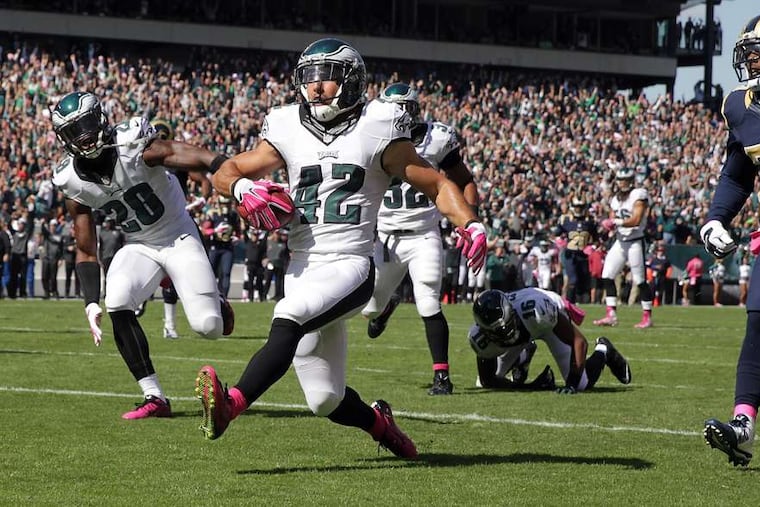Rothman must pay its share of former Eagles captain Chris Maragos’ $43.5 million verdict, appeals court rules
The appeals court also rejected Rothman’s argument that the Philadelphia jury’s verdict is excessive.

Rothman Orthopaedics Institute must pay its share of the $43.5 million verdict awarded last year to former Philadelphia Eagles captain Chris Maragos over a career-ending knee injury, Pennsylvania’s Superior Court has ruled.
In an opinion filed Friday, Superior Court found that a Philadelphia jury did not make an error in finding Rothman — whose physicians helped treat Maragos’ knee — negligent during a two-week medical malpractice trial in January 2023, and that the Jefferson Health-affiliated specialty orthopedic practice must pay the retired football player its share of the whopping verdict.
In June, a lawyer for Rothman appealing the verdict argued before a three-judge panel that the 2017 knee injury that ended Maragos’ NFL career was managed by an acclaimed surgeon, and that the Rothman physicians merely followed his guidance when they monitored the player’s rehab. The jury ordered Rothman to pay a third, or roughly $14.3 million, of the full verdict, and for renowned orthopedic surgeon James Bradley to pay $29.2 million.
In its opinion, Superior Court agreed with trial judge Philadelphia Common Pleas Judge Charles J. Cunningham III, who in response to a prior appeal by Rothman found that the jury did not err when it found Rothman negligent. Cunningham oversaw the two-week star-studded 2023 trial, which began the day after Eagles’ NFC championship victory over the San Francisco 49ers.
“[Rothman] doctors who supervised and continued to encourage rehabilitation on Plaintiff’s knee over complaints of pain and discomfort violated standard of care,” Superior Court President Judge Anne E. Lazarus wrote, based on expert opinion.
» READ MORE: Rothman Institute is ending its Eagles partnership as the official team doctors because of malpractice risk
Rothman ended its decadeslong relationship with the Eagles earlier this year, citing the risk of being found liable in another large verdict.
“Our legal team is carefully reviewing the ruling, and we are currently considering our next step,” the institute said in a statement Tuesday.
Maragos’ legal team did not immediately respond to requests for comment.
Torn meniscus and Nick Foles
Maragos was injured during a fall 2017 game between the Eagles and the Carolina Panthers. He tore his posterior cruciate ligament and injured his meniscus, a shock absorber inside the knee.
Bradley, a widely respected surgeon known for treating NFL players, including former Eagles quarterback Carson Wentz, surgically repaired the PCL but, according to Maragos’ lawyers, neglected to treat damage to the meniscus.
Bradley testified during the trial that he believed the meniscus did not require surgery, and that if he thought otherwise, he would have done it in “a heartbeat.”
Bradley was ordered to pay roughly $29.2 million. Court records do not indicate an appeal on his behalf. His attorney, John Conti, did not respond to a request for comment.
Bradley operated on Maragos’ knee, but it was Rothman’s physicians who oversaw the three-time All Pro player’s recovery at the Eagles’ NovaCare Complex throughout 2018.
Maragos, who was sidelined with his injury during the Eagles’ Super Bowl LII win, progressed throughout the year, but his rehab took a turn when the knee pain worsened that summer. Attorneys for the physicians argued during the trial that Maragos then sustained a new knee injury that occurred while lifting weights. He retired in 2019 without ever playing another game.
Maragos testified that Rothman physicians did not tell him about potential damage to his meniscus, and that his complaints about knee discomfort were dismissed as part of natural recovery.
Super Bowl MVP Nick Foles told the jury that Maragos, who was 31 at the time, was at the “peak of his game” and intended to continue to play had it not been for the injury.
» READ MORE: Rothman doctors shouldn’t pay in $43.5 million verdict for former Eagles captain, lawyers tell appeals court
During the Superior Court hearing in June, Maragos attorney Dion Rassias told the judges that the Rothman doctors should have shut down the rehabilitation despite Bradley’s instructions.
“You cannot have an athlete, a racehorse, running and training on a torn, extruded meniscus and expect he survives that,” Rassias said.
Rothman lawyer John J. Hare said that the institute’s physicians were in a no-win situation, forced to either perform “un-consented surgery” against Bradley’s assessment or continue Maragos’ rehab.
Verdict’s fallout
The jury awarded Maragos $43.5 million after less than three hours of deliberation, ordering Rothman to pay around $14.3 million of the full verdict. That amount has grown since because of delays in payments.
Rothman asked for a new trial in its appeal, arguing that the Maragos attorney didn’t prove that any of its individual physicians failed in their care.
» READ MORE: Philly saw a surge in medical malpractice filings after Pa. change on court location rules
But in the latest opinion, Lazarus rejected the argument, noting that court transcripts show that Rothman’s lawyers agreed with the wording of the verdict slip, which did not name any single Rothman physician. Because of that and a low insurance policy, all partners in the specialty practice are on the hook for a portion of the verdict, Rothman’s president, Alexander Vaccaro, told The Inquirer in June.
The appeals court also rejected Rothman’s argument that the verdict is excessive.
“Plaintiff was highly esteemed and paid NFL player projected to secure future contract and noneconomic damages difficult to quantify,” Lazarus wrote.